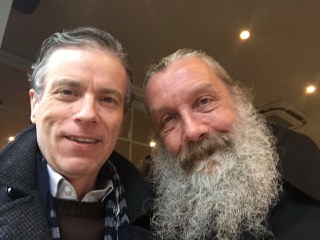If you’re inclined to enjoy longer posts try our AudiOpinion from narrator Simon Vance.

It was a crazy idea right from the start. I mean, phone calls and emails are usually enough to get the information I need to do the job of interpreting an author’s words. But this book was special—not only for its author and its length, but also for its setting in the author’s history-drenched home town.
I am speaking of Alan Moore, hailed as probably the best graphic novel writer in history (V FOR VENDETTA, WATCHMEN, THE LEAGUE OF EXTRAORDINARY GENTLEMEN, to mention but three), who had just finished ten years of his life working on his second novel JERUSALEM, his magnum opus. I had just been asked to narrate it.
It was Neil Gaiman who first made the suggestion that I make the trip, and Neil is a man—a writer—for whom I have the deepest respect. What an opportunity, he said. I should go to Northampton, meet with the great Alan Moore, and ask him to give me a tour of the very place that is the inspiration for JERUSALEM.
I recognized that I couldn’t pass up the chance to spend time with Alan Moore
The problem was that Northampton (a city in the center of England as well as being central to England’s history) is a very long way from my current home in California. Plus, I was a busy narrator. It was March and I was expected to have the book in the can by the end of June.
I dismissed the idea as crazy. Then the book arrived and landed with a resounding thump! (Okay, I exaggerate, it was a PDF, so it more or less landed with a ‘ping.’) But it felt heavy in my inbox, and it was indeed impressive at 1200 pages long and more than 600,000 words. I began to read it in what little spare time I had, usually in the middle of the night. Soon I was drawn in. I had fully entered the “Mindscape of Alan Moore” (yup, there’s a documentary on DVD by that name).
JERUSALEM is an amazing creation. It has three distinct parts (one hardback edition of the book splits it into three volumes). It was eventually going to amount to 60 hours of finished audiobook work and to take me every single day of June to record. And there is no easy way to describe it. Of course, I’m no critic, and I don’t write for a living. To put it simply, I just read the words and allow them to take me on a journey . . . and this one, I soon knew, was unlike any other. The more I read, the more I recognized that I couldn’t pass up the chance to spend time with the author. I would justify the expense to myself by saying that it would help me in my narration, but mainly I just wanted to hang with this extraordinary man (He really is unique. According to Wikipedia, “Moore is an occultist, ceremonial magician, and anarchist.”)
So by mid-May I was checking flight schedules, adding up air miles, and trying to find out if Alan Moore would be available in the two-day slot I could have in the UK. Now that was an issue. You don’t just email Alan. He doesn’t have email; he doesn’t even have an answering machine. You either catch him on his home phone or you don’t.
Eventually, through Neil, I got in touch with Alan’s daughter, who said there was a chance her father MIGHT be available. I couldn’t wait for a confirmation, I had to snatch the flights before they went away. I rationalized that even if I couldn’t meet him, I could wander around Northampton on my own, and that alone would add to my experience of the novel. I braced for the fact that I might never meet the elusive author, and would be very disappointed.
Alan had indeed agreed to meet me and had chosen a rendezvous point . . . Pizza Express on Derngate! Really, Pizza Express?
As it happened, I left San Francisco on an overnight flight Monday, the 30th of May, arriving on Tuesday, and drove right from Heathrow to Norfolk to see my son, who was on a four-month visit to the UK. Then, on Wednesday, I drove from Norfolk to Northampton. By this time, Alan had indeed agreed to meet me and had chosen a rendezvous point . . . Pizza Express on Derngate!
Really, Pizza Express? Not some darkened basement where the anarchists hang? But truth is, despite his anti-establishment reputation, Alan is really quite normal. His book has multiple influences and ranges far and wide, but centers itself in the philosophy of eternalism (briefly described: past, present, and future coexist and we live our lives over and over again if we wish). And, when you meet Alan, you find a most charming, charismatic, endearingly eccentric typical working class Englishman in his 60s.
After the necessary conversation about the book (details over pronunciations, etc.) he took me on a walking tour of “his neighborhood,” the Boroughs. (JERUSALEM is almost a love letter to the people and the place.) It rained lightly the whole time but neither of us commented on that (this is England, after all), and eventually we sought shelter in the local coffee shop–Caffè Nero (“… Nero…? You might as well call it Caffè Caligula” he comments in the book). The best part of our conversation took place over the next couple of hours. He and I are not far different in age, and apart from the difference in class we both had similar experiences growing up in 1960s England. However, Alan recognized early on the hypocrisies around us that took me longer to see.
We said our farewells and I flew home on Thursday and began recording the introduction, “Work in Progress,” the very next day. With only one day off, I finished the narration 29 days later. I phoned Alan several times in those days for some clarification (he told me that the “frankly unreadable” chapter–his words, not mine–was best attacked with an Irish accent), and was available and helpful every time.
Did my crazy trip help make this a better recording? I really think it did. And in any case, I have a new friend—and that’s beyond value. On the book’s publication he sent me a signed copy, to “Simon, my eternal chum.” The idea of spending eternity in conversation with Alan actually excites me.—Simon Vance
JERUSALEM
Alan Moore, read by Simon Vance
Recorded Books
AudioFile Earphones Award




